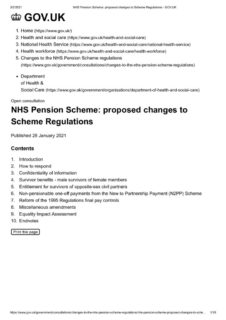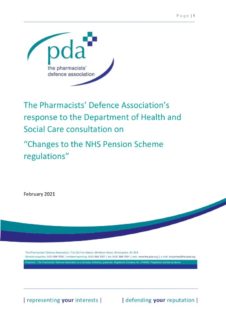This is part of the PDA’s ongoing work to ensure the NHS pension scheme delivers value and fair and equitable treatment for all members eligible to join.
The PDA has therefore also responded to a new consultation again welcoming the Government proposals set out in the consultation document. Perhaps unusually these proposals address a situation where men whose partner is a woman were receiving less favourable treatment than men in single-sex relationships, a very clear discrimination on the grounds of sexuality. The consultation document and our response can be found at the bottom of this page.
Paul Moloney, PDA Union National Officer, and member of the NHS Pension Board explains however that discrimination on the grounds of sex and sexuality, unfortunately, has a long history in the NHS scheme, and the very latest consultation addresses one of the few areas left until now:
“It should be stressed that this consultation and the outstanding discrimination occurs only in the 1995 Scheme. The 2008 scheme, including the 2015 section of that scheme, removed discrimination on sex and sexuality from the start, although the age discrimination now outlawed occurred in each of these schemes or sections.
Nevertheless, many members may well still have benefits in the 1995 scheme, with benefits due to your partner on your death until now being different depending on your sex or sexuality.
The root cause of the discrimination can be traced back to the view that women went to work to earn “pin money” and were never the main breadwinner in a family. This view was prevalent in society well into the 1980s and beyond but was first confronted with the Equal Pay Act of 1970. This required men and women to be paid the same for work of equal value.
Unfortunately, many pension schemes continued to have rules that reflected this outdated and sexist attitude towards women well into the 1980s. It was only through trade union pressure and a determination of individual scheme members to enforce their legal rights that change occurred. Change that was resisted on every occasion by the Government of the day.
This attitude towards women at work meant that the benefits paid on the death of a member of the NHS scheme differed depending on whether you were a man or a woman. If you were a man, your wife (you had to be married until civil partnerships were introduced) would get a spouse’s pension based on your pensionable service. If you were a women scheme member your husband would not get a spouse’s pension. As it was a requirement to be married anyone in a single-sex relationship, whether male or female, at this time received nothing on the death of the scheme member.
In 1988, following campaigns by trade unions, this changed and from this date onwards a husband of a female scheme member received a pension on the death of his wife, but only based on service since 1988. A wife of a male scheme member continued to be eligible for a pension based on all service including that before 1988. Effectively the issue was resolved for the future but meant many dependent pensions were vastly different in value depending on whether you were a male or female scheme member. If you were in a single-sex relationship your partner still received nothing.
With the introduction of civil partnership, gay marriage, and then the Equality Act in 2010 discrimination on the grounds of sexuality became illegal. However, the scheme did not change its rules to reflect this. Instead in 2012 a gay man, Mr. Walker, began his legal case to force the NHS Scheme to remove this discrimination and pay benefits to the partners of gay men and gay women scheme members. Five years later, having been forced all of the way to the High Court he won his battle. In 2019, finally, the scheme rules were changed and the partners of gay men and gay women scheme members received a pension on their death.
That should have been the end of the story, but it wasn’t. When making the rule changes Government decided to treat all dependents of single-sex partners as if they were widows under the rules. This of course was the more favorable option and meant the 1988 limit on the service counting towards the pension for widowers of scheme members did not apply to anyone in a single-sex partnership.
So, the Government managed to create a situation where straight men were being treated less favorably than gay men or women. Just as illegal as any other discrimination covered by the Equality Act.
Male dependents of female scheme members would therefore receive a lower pension on the death of their partner than an equivalent male in a single-sex partnership. This is of course because the male dependent of a female scheme member was still limited to a pension based only on service since 1988.
So another legal challenge from a scheme member, Mr. Goodwin, last year has led to this further proposal to change the rules. At least this time the Government has accepted the ruling of the Employment Tribunal and not appealed decisions all the way to the High Court as it has in the past with Age discrimination (McCloud) and Sexuality (Walker).
The PDA Union has of course welcomed the proposals that will see all men and women treated equally in the future regardless of whether they are male or female, and regardless of whether their partner is male or female.
Unfortunately, far fewer people will have service dating back to before 1988 which means for many people it is simply too late for this change to be meaningful, but nevertheless, it finally puts right a wrong originating at the time the NHS scheme was first set up.
It does show however how discrimination against one group can lead to further discrimination against another group. There are probably few other examples of how an initial discrimination based on sexist attitudes about the role of women at work, including in providing healthcare, became a discrimination against gay men and women which in turn became a discrimination against straight men. It has taken those with a clear understanding of the harmful impact treating anyone unfairly has and a consistent approach of opposing all forms of discrimination to push the NHS pension scheme to the place it has finally reached.”
Commenting on Paul’s update, Anjlee Shah, a member of the LGBT+ Pharmacists’ Network said:
“The PDA equality diversity and inclusion (EDI) networks are about removing inequality. The circumstances of straight men receiving worse treatment than their LGBT+ peers is just as unacceptable as if the discrimination were the other way around. The PDA commitment to ensure this issue is resolved is a great example of our ethos that equality is only achieved when nobody is subject to discrimination. We fight for equality for all.”
Daniela Rusalim, Vice-President of the National Association of Women Pharmacists added:
“Starting with discrimination against working women, the pension scheme has never truly been non-discriminatory in nature despite a statutory requirement to comply with equality law. Instead of trying to repair the injustice, successive governments have failed to address the discriminatory aspects and have waited until forced by the courts to act, then introduced partial fixes and in this case replaced one type of discrimination with another. No entitlements to employee benefits should discriminate on sex, sexual orientation or any other protected characteristic.”
Download the consultation document here

